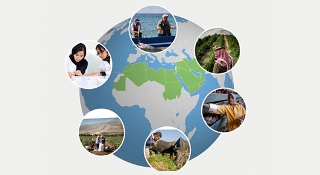CSOs’ Eye on FAO Regional Conference

In the Lebanese capital, Beirut, Green Line Association hosted civil society organizations (CSOs) from across the Near East and North Africa region on 7–9 April in preparation for the Food and Agriculture Organization (FAO) 33rd Regional Ministerial Conference for the Near East and North Africa to be held in Rome during 9–13 May. Regional affiliates of the International Planning Committee for Food Sovereignty organized the regional consultation with the aim to develop civil society input into the biennial policy forum by reviewing FAO reports and related conference papers. The CSOs applied their combined visions, expertise, knowledge and technical capacity to the issues to be discussed at the 33rd Near East Regional Conference (NERC) and considered ways to collaborate with FAO’s regional initiatives.
Representatives of FAO’s Lebanon Office, Regional Office (Cairo) and its Rome-based Partnerships Unit (OPCP) served as resource persons to advise the participants on procedural and substantive matters. The CSO consultation included plenary discussion of the coming NERC 33 agenda and small-group deliberations that covered a range of issues, including FAO activities and achievements in:
The 29 participants from 10 countries called for addressing the issue of empowering women within a scope broader than the issue of small farmers. They also agreed on the need for FAO programming to address issues related to women supporting households with regard to food and nutrition, including those within, but also beyond the group of small producers in agriculture, fishing and raising livestock.
The rights, needs and empowerment women were also addressed at a separate session dedicated to small-scale producers. That was consistent with FAO’s three regional initiatives, which the region’s states defined at NERC32 in 2014 as the organization’s top priorities for the ensuing two years:
Participants noted that reporting on these regional initiatives lack a clear assessment of results from related projects and programs. The FAO representatives explained the process of continuous planning and resource mobilization needed to operationalize these priorities in the longer term.
The CSO consultation process also included a survey of participants’ priorities among multiple subjects for collaboration in the inter-sessional period; that is, the 34th NERC in 2018. The outcome reflected common CSO priorities, in general, including cooperation in processes and substance issues. The CSOs gave the highest importance to supporting small producers in the agriculture, fishing and pastoralism through collective work toward creating a forum or mechanism for their direct collaboration to advance their mutual support and strengthen their own voice in the formulation of policies that affect them. Other urgent subjects of potential collaboration included developing and delivering region-specific training and knowledge building to apply the FAO’s Tenure Guidelines, as well as activating a strategic regional forum on the right to water. Small groups formed to develop practical actions to address these priorities and existing initiatives in the coming period.
The CSOs identified other areas of needed collaboration such as relating to the various ongoing global policy processes as they concern land, agriculture and rural development, in addition to an ambitious proposal to pool local knowledge and information that is more-reliable than official sources through the development of a regional database.
On the third day if the consultation process, participants elected three representatives to represent civil society at NERC33, observing geographic and gender diversity, while ensuring also that the delegation include a representative from Palestine.
At the end of the consultation participants agreed on the need to define a work plan that includes a timetable to start implementing the regional network’s initiative for small producers, giving priority to the principles of tenure guidelines, developing a monitoring mechanism and following-up the issue of water scarcity. The CSOs also recognized that they would bring added value to FAO efforts through closer partnership, as well as complementing local relevance and reach of interventions, while especially supporting the process rights of local producers to organize and articulate their needs and interests where policy is formed.
Download CSO Declaration to NERC33
See also:
Toward FAO’s Near East/North Africa Regional Conference
FAO-CSOs consultation on FAO priority activities in NENA region
For queries about further information, please contact:
jschechla@hic-mena.org or amansour@hic-mena.org
|